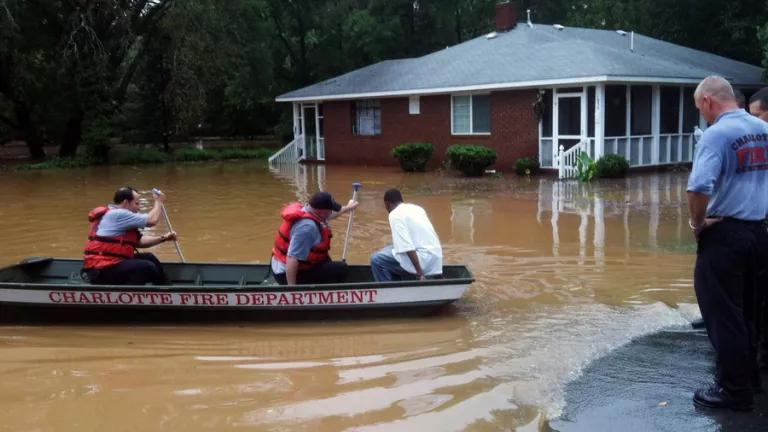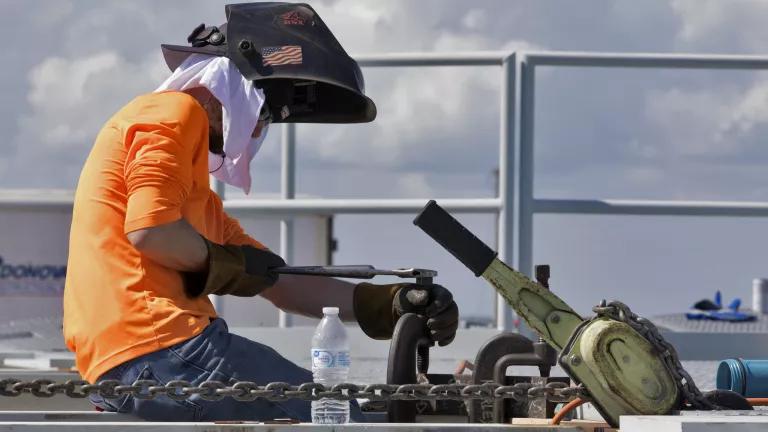Blueprint of a Buyout: Charlotte/Mecklenburg County, North Carolina
Locally funded buyouts in North Carolina can move faster than traditional programs - could this be an option for more communities?

Flooding in Charlotte, NC after heavy rain in 2011.
"CFD Flood Response 8.5.2011" by the Charlotte Fire Department, shared under CC BY 2.0.
NRDC’s new report Going Under: Long Wait Times for Post-Flood Buyouts Leave Homeowners Underwater highlights the long timelines of FEMA-funded home buyouts. During a buyout, local or state governments purchase flood-damaged properties from willing sellers at pre-flood values and preserve the land as open space. But once a property is included in a request for FEMA funding, homeowners can be kept in limbo for years, waiting to find out if their homes will be purchased.
In the aftermath of Hurricane Harvey, Roy Wright (FEMA’s deputy administrator for mitigation and insurance) said, “I’m working with my team and lawyers on ways I can move [buyouts] to the front. The point is, I’m not going to pay someone to redo their house, then re-buy it.” But long wait times mean that homes are often repaired and rebuilt over and over, even when the residents would prefer to move—wasting time, money, and an opportunity to reduce risk, not to mention adding to the stress and trauma of flood survivors.
In this blog series, we’ll take a closer look at some existing buyout programs and how they are affected by these long timelines.
People whose homes have been flooded “want to be done with flooding—it’s destroying their lives and properties,” says Tim Trautman of Charlotte-Mecklenburg Storm Water Services (SWS). It is one of the reasons that the agency decided to create its own buyout program, one that could move faster to purchase properties and does not rely solely on FEMA funding.
Charlotte-Mecklenburg SWS, a joint county/municipal stormwater utility, began using voluntary buyouts as its primary flood mitigation strategy about 20 years ago. After several years of implementing FEMA-funded programs, SWS came to a couple of conclusions: first, the Charlotte area is mostly affected by flooding that is too localized to warrant a federal disaster declaration—meaning that HMGP funding is often unavailable for buyouts. Second, the long timeframes associated with FEMA funding meant that residents tended to rebuild after filing a flood insurance damage claim while waiting for a buyout, resulting in fewer buyout participants and higher purchase costs.
In response, SWS established its own Quick Buy program in 2003, supported by a “Rainy Day” fund. SWS’s annual buyouts and the “Rainy Day” projects are almost entirely funded by local stormwater fees. Therefore, the program is not reliant on federal funding, so it is able to move much more quickly to purchase damaged homes after floods.
SWS establishes its own criteria for eligible properties, identifies potential participants before flooding occurs, and makes purchase offers within months of a flood event, before owners invest flood insurance claims or personal savings in major repairs. Moving quickly lowers the costs that SWS pays for homes, because the purchase cost does not include any post-flood improvements. Contrast that with FEMA-funded buyouts, where FEMA pays out a flood insurance damage claim through the NFIP, then maybe years later pays again by purchasing the home at a value that reflects all updates completed while making repairs. Another advantage for SWS is that it sets its own eligibility criteria based on local priorities, allowing the program to consider a wider range of public benefits than those captured in FEMA’s calculations.
To date, SWS has purchased over 400 properties, returning 185 acres to open space and avoiding over $25 million in losses and counting. Buyouts are typically completed within six months of a flood, and Trautman is working to make them even more efficient.
However, not every community has the capacity to establish self-funded buyout programs. SWS’s program requires a substantial, annual local investment and relies on a customer base that can support the necessary stormwater fee. All communities should have the opportunity to take advantage of the benefits of buyouts, but current federal programs don’t allow for the short turnaround times that have contributed to SWS’s success.
Special thanks to Tim Trautman and Dave Canaan of Charlotte-Mecklenburg Storm Water Services for their input on this blog post.




